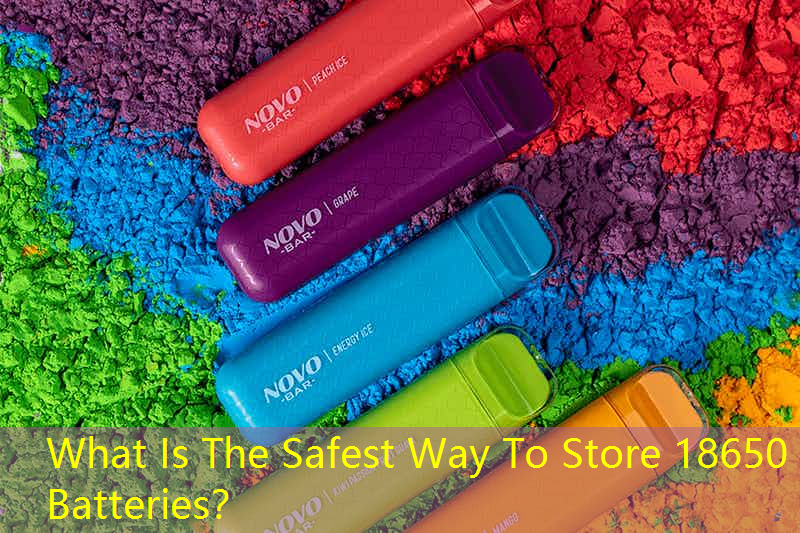1. Муқаддима 18650 Батареяҳо
Пашна 18650 Батарея батареяи барқгирандаи литум-и Ритди мебошад, ки маъруфияти калон дорад, алалхусус дар ҷомеаи фарсудашуда ва электроникаи сайёр. Ин батареяҳо бо иқтидори баланд ва қобилияти таъмин намудани баромади мавҷуда маълуманд. Бо вуьуди он, Бо ин афзалиятҳо мулоҳизаҳои асосии бехатариро дар бораи нигоҳдории худ меоранд. Таъмини дуруст барои таъмини дарозумрӣ ва пешгирии садамаҳо, ба монанди ихроҷ, сӯхтагӣ, ё таркишҳо. Дар ин мақола, Мо усулҳои бехатарро барои нигоҳдорӣ муҳокима хоҳем кард 18650 батареяҳо.
2. Фаҳм 18650 Battery Chemistry
Before delving into storage methods, он барои фаҳмидани химияи асосӣ муҳим аст 18650 батареяҳо. Ин батареяҳо аз ҳуҷайраҳои литӣ иборатанд, ки ба омилҳои экологӣ, ба монанди ҳарорат ҳассос бошад, намнок, and physical stress. Improper handling can lead to thermal runaway—a dangerous condition where the battery overheats and can potentially ignite. Ҳамин тавр, understanding battery chemistry is vital for safe storage practices.
3. The Importance of Temperature Control
One of the most critical aspects of battery storage is temperature. 18650 batteries should ideally be stored in a cool and dry environment. Extreme temperatures can significantly impact battery performance and safety. Storing batteries in high temperatures can lead to swelling, leakage, or even fire. Баръакс, storing them in very low temperatures may cause them to lose their charge capacity. The recommended storage temperature for 18650 batteries is between 20°C and 25°C (68°F to 77°F).
4. Optimal Humidity Levels
Humidity also plays a crucial role in the safe storage of 18650 батареяҳо. High humidity levels can lead to corrosion on the battery terminals, increasing the risk of short circuits. Идеалӣ, the storage space should have low humidity levels, typically between 30% ва 50%. Using silica gel packets or other desiccants can help maintain the desired humidity levels in the storage area.

5. Using Battery Cases
To enhance safety, it is advisable to use dedicated battery cases designed for 18650 ҳуҷайраҳо. These cases provide physical protection and prevent short-circuiting between batteries. Always ensure that the battery terminals are covered or shielded to avoid accidental contact with conductive materials. Ғайр аз он, choose cases that are impact-resistant and made from non-conductive materials.
6. Avoiding Incompatible Batteries
Mixing different brands, capacities, or chemistries of 18650 batteries is highly discouraged. Using incompatible batteries can lead to imbalanced charging and discharging cycles, which increases the risk of overheating and failure. Always store batteries from the same batch together and avoid combining new and old batteries in devices or chargers.
7. Regular Visual Inspections
Regular checks are vital to ensure that the stored 18650 batteries are in good condition. Inspect the batteries for any signs of damage, such as bulging, corrosion, or leaks. If any battery exhibits these signs, it is essential to dispose of it safely and in accordance with local regulations. Staying proactive helps mitigate potential hazards associated with battery storage.
8. Understanding Your Device Requirements
Different devices may have different requirements regarding battery capacities and types. When storing batteries, consider the specific needs of your device, whether it be an e-cigarette or a vape mod. Refer to the manufacturer’s guidelines for the best practices related to battery usage and storage, ensuring that you maintain safe operations.
9. How to Store Batteries for Long Periods
If you plan to store 18650 batteries for an extended period, it is crucial to discharge them to a safe storage voltage, typically around 40%-60% of full charge. Storing fully charged batteries can lead to capacity loss and potential hazards, while completely drained batteries can become inoperable. Ғайр аз он, store them in a temperature-controlled environment and inside a suitable case to prevent any physical damage.
10. Disposal of Damaged Batteries
In case a battery is damaged or compromised, proper disposal is paramount. Never throw away lithium-ion batteries in regular waste, as they pose environmental risks. Ба ивазаш, locate a battery recycling program or hazardous waste facility that can safely dispose of these batteries. Ensuring responsible disposal helps protect the environment and minimizes accidents.
11. What is the safest way to store 18650 батареяҳо?
The safest way to store 18650 batteries involves multiple factors. Аввал, keep them in a cool, dry environment with temperatures between 20°C and 25°C. Use dedicated battery cases to prevent short-circuiting and physical damage, and maintain low humidity levels. Avoid mixing incompatible batteries and conduct regular visual inspections to ensure their condition.
12. Why is temperature control essential for battery storage?
Temperature control is crucial because extreme temperatures can negatively affect the performance and safety of lithium-ion cells. High temperatures may cause overheating, swelling, and potential fires, while low temperatures can lead to capacity loss. Maintaining a stable environment between 20°C and 25°C ensures the longevity and proper function of 18650 батареяҳо.
13. How can I properly dispose of damaged 18650 батареяҳо?

Proper disposal of damaged 18650 batteries is critical to avoid environmental harm and safety issues. Do not throw them in regular trash. Ба ивазаш, locate specialized battery recycling programs or hazardous waste disposal sites in your area. Following local regulations for battery disposal ensures responsible handling and minimizes potential accidents.







